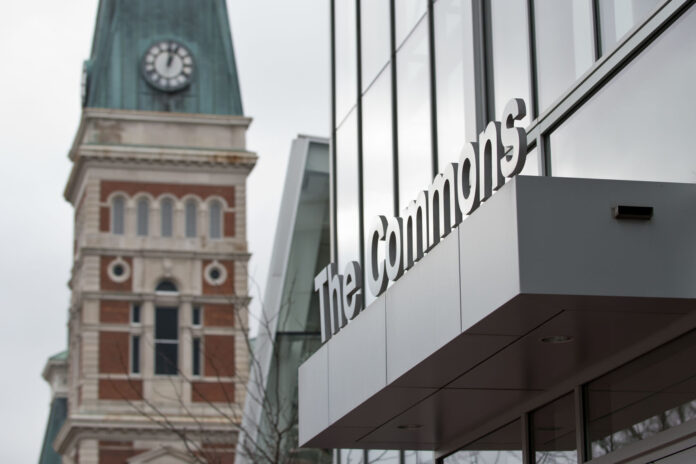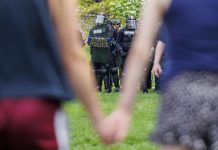
Local courts are “catching up” as jury trials are resuming in Columbus after a year of restrictions.
The early months of the COVID-19 pandemic brought a number of changes for local judges and their staff members. While an arrangement was made in June 2020, to use The Commons for jury selection, tougher restrictions eventually came out that limited the number of people allowed in one gathering place to 50 or fewer.
Next came an order from the Indiana Supreme Court. Known as Administrative Rule 17, the order suspended all jury trials throughout the state from Dec. 14, 2020 until March 1, 2021.
With the Bartholomew County Courthouse was mostly closed to the public, court activity was mostly confined to essential matters in 2020, especially those dealing with defendants kept behind bars, the judges said. Most civil cases were placed on the back burner.
Although Hoosiers began getting vaccinated in phases after the first of the year, access to the Bartholomew County Courthouse was limited to one degree or another until May 3.
While the vaccine made a significantly positive change, the three major courts actually began playing catch-up after state-of-the-art video conferencing began allowed select hearings to take place without having to put everyone in the same room.
The Zoom video conferencing is most effective during attorney motion hearings, pre-trial conferences and other court dates that don’t require defendants to be physically present, Circuit Court Judge Kelly Benjamin said.
“We’ve also had some attorneys at high risk for catching the virus that should not and could not be out, so video conferencing allowed us to keep a number of hearings going on,” Benjamin said. “A lot of this technology will stay in place.”
Jury safety
All three major courts in Columbus operate with the same protocols established by the Centers for Disease Control and Prevention, as well as state and county health departments, Bartholomew Superior Court 2 Judge Jon Rohde said.
The local status of the virus spread in the community is checked daily, and the judges meet to discuss whether additional safety measures should be considered, he said.
“You won’t see a lot of variations in protocol within the courthouse,” Rohde said.
Potential and selected jurors are required to wear an mask if they are not fully immunized for COVID-19. But if the juror has received the required levels of the vaccine, it is their choice whether or not to wear a mask in court, according to court officials.
One key safety factor for jurors are the plastic panels that separate each jury seat in Judge Jim Worton’s Superior Court 1 courtroom.
If any court requires a six-person jury, the trial will be held in the presiding judge’s courtroom because social distancing can be maintained with a small number of jurors. But if a 12-person jury (with two alternates) is required, arrangements will be made to use Worton’s courtroom with the partitions, Rohde said.
Of the four trials that Benjamin presided over this year, one did take place in the Bartholomew Superior Court 1 courtroom.
All three courts have been supplied with masks, hand sanitizers and disinfectants, court officials said. There are hand sanitizing stations in the hallways at a number of locations within the courthouse.
Catching up
As the courts begin to tackle their caseloads, there is more strain on nearly everyone in the judicial system, Benjamin said.
For deputy prosecutors handling multiple cases as once, they are forced to quickly figure out which defendant is likely to go on trial, the judge said. When that determination is made, the state still has to prepare their case and get witnesses subpoenaed.
“Defense attorneys are sort of in the same boat,” Benjamin said. “Depending on how many cases they have in that court, it puts stress on them to move things a little quicker. They have to talk with witnesses and attorneys to make sure they are ready to move ahead with that case. There’s no more waiting until the last minute.”
While Bartholomew County Prosecutor Bill Nash says he appreciates the judge’s concern, he also expressed his belief that his staff has things under control.
“The current (jury trial) back up may be greater than most, but does not seem to me to be at least an order of magnitude different from the usual experience,” Nash said.
In contrast, one of the problem-solving courts, Family Recovery, is backed up by at least two months, if not three, Benjamin said.
“If you are looking at a full-day trial, you are looking at the new year to get that,” Benjamin said.
Court staff are now required to create a larger jury pool because a number of potential jurors claiming they have complications that make them at high risk for COVID-19, she said.
“We ask for medical proof, but that gets a little dicey,” the judge said. “Where we used to call 45 to 50 people for a six-person jury, we had to start calling more because some have a valid excuse not to serve on the jury, and some do not.”
But Benjamin describes all of these complications as challenges, not problems.
“We can’t slow down, because we’ll end up being backed up for years — and we’re not going to do that,” Benjamin said.
Moving ahead
Most days set aside for possible trials in Circuit Court have, on average, 35 to 45 cases on the docket, Benjamin said. That’s considerably more then the 12 to 15 cases that used to be listed, she said.
There are 53 cases listed on the docket for Aug. 31, Circuit Court office manager Tammy Johannesen said earlier this month. Trials are prioritized by whether the defendant is in jail, how long the defendant has been incarcerated, and how old the case is, Johannesen said.
But one fact that will help the courts is the fact that the vast majority of U.S. criminal cases are never heard by a jury. On average, 94% of state-level felony convictions across the country are the result of plea bargains, rather than jury trials.
And that figure appears to be high when compared to the Columbus area.
“I would guess that 99% of the cases we file are resolved by way of a plea agreement,” Nash said in an interview last year. “Jury trials are very rare here.”
When a plan was developed that detailed how the local judicial system would deal with COVID-19, all the judges met to discuss and approve the final draft, Benjamin said. There were also meetings with attorneys, staff, court services and law enforcement to get their input, Benjamin said.
Both prosecutors and defense attorneys were strongly urged to give the courts early notice of changes, so judges can adjust their calendars and not waste valuable court time, the judge said.
“We emphasized to everyone that with a pandemic, we are all on new and unknown ground, so we needed the cooperation of everyone,” Benjamin said. “And everyone has stepped up.”
Not over yet
If the community does not have another hit from COVID-19 that closes down public buildings again, Benjamin anticipates her court docket will be back to some form of normalcy by early next year.
However, should another wave of the virus overtake the local community, “we will have to readjust,” Benjamin said.
Worton said his concern over a large backlog of jury trials really did not materialize.
“There have been cases that, due to special circumstances, had to be continued,” he said. “And some are waiting on new hearings. But we were really quick about handling matters through Zoom. I don’t feel like we’re that far behind right now.”
In Superior Court 1, every Tuesday is set aside for a potential jury, with criminal and civil trials alternating on a weekly basis, he said.
Priorities in scheduling criminal trials include whether the person is incarcerated or not, Worton said. And if two defendants are behind bars, the person who has been in jail the longest would be the one that would go, he explained.
Worton said his court will continue to use video conferencing — especially for summary judgments made without a full trial and on attorney-status conferences — evan after the virus is no longer a health threat.
Rohde says civil jury trials were significantly delayed due to last year’s delays.
“We are already scheduling these type of trials into the winter months of 2022, as well as the last three months of next year,” Rohde said.
But Bartholomew Superior Court 2 is “back on pace” with its criminal case load, Rohde said, adding the court accommodated every criminal defendant’s request for a fast and speedy trial.




